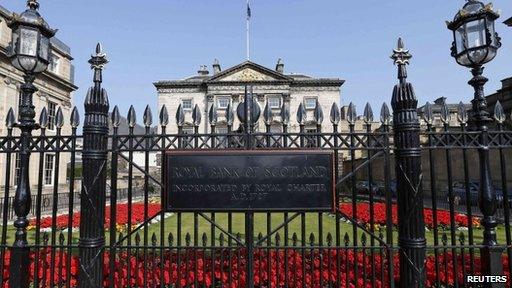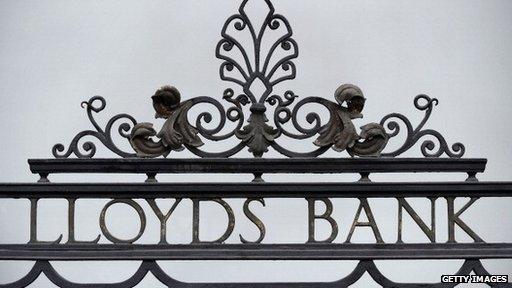Banks lead business reaction to the Scottish referendum
- Published
- comments

RBS will remain at its registered headquarters at St Andrew's Square in Edinburgh
Sterling wasn't the only thing with a spring in its step this morning. Business leaders who had expressed concerns about the possibility of independence will also be relieved that all those contingency plans for possible upheaval can be put away - for the foreseeable future at least.
Ross McEwan, the chief executive of the Royal Bank of Scotland, was the man facing the biggest headache if Scotland voted Yes.
The bank (major shareholder, HM Government) announced its "contingency plans" should there be a Yes vote last week.
That included moving its legal headquarters to London. The major threat was the possible downgrading of an independent Scotland's credit rating which would have affected the cost of borrowing for RBS.
There was also the risk that the Bank of England would not have remained the lender of last resort.
Mr McEwan felt they were risks the bank could not take. It would have moved.
'Business as usual'
That will now no longer happen and the bank, incorporated in 1727, will remain at its registered headquarters at St Andrew's Square in Edinburgh.
In a statement this morning, RBS said: "The announcement we made about moving our registered head office to England was part of a contingency plan to ensure certainty and stability for our customers, staff and shareholders should there be a Yes vote.
"That contingency plan is no longer required. Following the result it is business as usual for all our customers across the UK and RBS."

Interestingly, Lloyds Bank also made a statement, but one far more equivocal. It also said last week that it was considering moving its legal base from Edinburgh to London.
The bank said today: "Lloyds Banking Group has maintained a neutral stance in this debate as we believe the decision was solely a matter for the people of Scotland.
"The Group is proud of its strong Scottish heritage and remains committed to having a significant presence in Scotland. We remain fully focused on supporting households and businesses in Scotland as well as right across the rest of the UK."
I am told the bank did not want to make a final statement on its legal home until other, significant, regulatory matters are dealt with.
That, sources tell me, includes "ring-fencing" - the government's proposals to split retail and investment banking. Lloyds wants to keep its options open until those plans are finalised, which is not likely to happen until 2018.
Devolution
Other business groups including the CBI, the British Chambers of Commerce and the Federation of Small Businesses all welcomed the no vote, saying it would lead to greater certainty in the markets.
Standard Life - the insurance business based in Edinburgh - also said it remained committed to the country. It said last week that it was considering starting new businesses in England in the event of a yes vote so that English customers with pensions and savings would be protected from any fallout.
Business attention will now quickly turn to the constitutional changes announced by the prime minister this morning. Although initially it may not seem a business matter, greater federalism in the UK could have significant ramifications.
Robb Wood, chief UK economist at Berenberg, said: "Devolution, if implemented well, could bring benefits while an English Parliament, if politicians set one up, may be more business friendly."
There may never be an English Parliament - I'm sure the last thing voters want is more politicians - but if powers over the setting of taxes and business policies for example are devolved to the four nations of the UK, then chief executives will have to sit up and take notice.